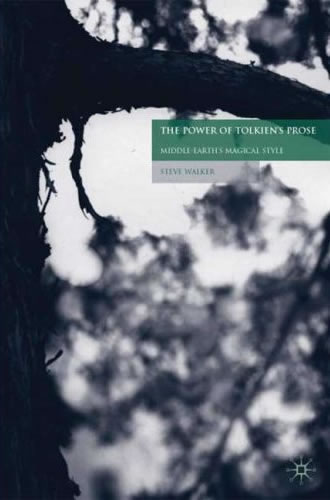Interview with Steve C. Walker, author of The Power of tolkien's Prose (22.07.09 by Pieter Collier) - Comments
In the mean time let me announce a book that will appear at the end of the year, addressing the "lack of discussion of tolkien's style" in scholarly interrogations of that writer, this book uncovers the multifaceted appeal of tolkien's prose style. It is called The Power of tolkien's Prose: Middle-earth's Magical Style and is written by Steven C. Walker.
Steven C. Walker is Professor of English at Brigham Young University, USA and author of Seven Ways of Looking at Susanna, A Book of Mormons, and Mourning with Those who Mourn.
Here follows an interview with the author Steven C. Walker about his upcoming book The Power of tolkien's Prose: Middle-earth's Magical Style.
TL: You are the author of "The Power of tolkien's Prose: Middle-Earth's Magical Style" could you tell us what this book is about?
SW: All writers create. Tolkien takes that a step further by stimulating "sub-creation." He involves us in the creative process, invites his readers to help shape his fictive world. The reason we feel so attached to Middle-earth, as if we've been there, is because we have been -- we help imagine it.
TL: How did you get interested in the Tolkien?
SW: I opened The Lord of the Rings one afternoon with my usual reluctance about fantasy. Next day I was stunned to find myself still reading it, with no interruptions for food or even a scheduled 2:00 a.m. Marx Brothers movie, and something close to panic when I realized there was no more of it to read after the appendices -- the single most engrossing reading experience in a long readaholic life.
TL: What prompted you to write your book?
SW: For a died-in-the-wool realist who always hated fantasy, what gets to me most about this fantasy is how real it is, how psychologically apt and relevant and engagingly true to life. I've been thinking for a half century that someone should write a book about how Tolkien pulls that off.
TL: Why do you think there is a "lack of discussion of Tolkien’s style" in scholarly interrogations?
SW: Style isn't on our scholarly radar. Our best readers these days are mostly sociological critics, focused on cultural studies or gender studies or economic studies or religious studies or new historical perspectives. We've been so concerned with how Tolkien fits into the cultural landscape we haven't noticed much about his writing style, though that mattered a lot to Tolkien himself -- I think he'd like this book.
TL: Where lies the biggest appeal of Tolkien’s prose style?
SW: Its invitational quality: he's as gifted as any writer I know at including his readers in the imaginative process. He involves us in imagining ourselves into his hobbits' quest through subtle and ingenious stylistic strategies -- I've been amazed to find what a clever literary tactician he is. I think Tolkien fans will like the way this book gets deeper into his text in pursuit of its stylistic secrets, and like its premise that the better we read Tolkien, the better he is.
TL: Do you think tolkien's prose style is the key to his success?
SW: For me it is. He's seen more as a cultural icon than as an artist, "a great storyteller and a bad writer." But anybody who can write well enough to make me like fantasy has to be a heck of a writer. We've seen him survive so many shifting cultural fashions we can be pretty sure it's not his sociological relevance so much as his writing ability that has made him hold up so well into the twenty-first century.
TL: If you saw the Lord of the Rings movie adaptation, do you have the feeling tolkien's prose style came to its right function there?
SW: Peter Jackson's profound respect for the text, which he and the cast read nightly during filming, paid off. I hesitated to see the first movie because I worried it couldn't compete with my own imagined Middle-earth. But the films deserve eleven Oscars. They convince me Middle-earth might be located not just in my Utah mountains but in New Zealand.
TL: What special qualifications do you have for making this study? What makes you different from your colleagues?
SW: I'm more interested in critical approaches as lenses than as frameworks. So I'm more concerned with a literary work itself -- especially this work -- than how it fits into a critical viewpoint. That focusing away from outer applications has allowed me to really get into the inner workings of The Lord of the Rings.
TL: What are your expectations for this book?
SW: I'm convinced a lot of thoughtful readers are interested in seeing ways Tolkien engages us in his world, ways he works his word magic. We've noticed so little about his style that any investigation in that dimension is likely to be illuminating for his readers -- there's so much going on stylistically in The Lord of the Rings, so much for this book to tap in to. I'll be elated if readers react to the book as a reviewer has: "I will never see tolkien's world in the same light."
TL: A final question. I read you find the Bible as literature even more fun, is there a link between Tolkien prose and the Bible?
SW: tolkien's essential stylistic tactic is to lure us into filling in the blanks, like Genesis when it says "creeping things that creepeth upon the face of the earth" and leaves the specific details of spiders and geckos and snails and mice and crabs up to our individual imaginations. tolkien's writing, too, sounds vividly detailed, as with his descriptions of hobbits, but he's actually giving us an open-ended outline between those furry toes and that big-bowled pipe that invites us to picture for ourselves what Frodo looks like. tolkien's style is training wheels for our imagination -- he's inviting us to create our own personal Frodos.
Type: Hardback
Estimate: 208 pages
Publisher: Palgrave Macmillan
Publication date: November 24, 2009 (US), December 25, 2009 (UK)
ISBN-10: 0230619924
ISBN-13: 978-0230619920
Spread the news about this J.R.R. Tolkien article:

